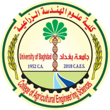The Role of the College of Agricultural Engineering Sciences in Serving Students
The College of Agricultural Engineering Sciences plays a significant role in serving students by providing a range of services and opportunities aimed at developing them academically, professionally, and personally. Below are the main roles the college undertakes to support students:
A. Academic Education and Training
- Offering comprehensive and diverse study programs covering various agricultural fields such as plant production, animal production, food industries, and agricultural engineering.
- Delivering advanced curricula based on the latest scientific research and agricultural technologies.
- Providing practical and field training to equip students with the necessary applied skills for the job market.
B. Professional Qualification
- Preparing students for the job market through specialized training programs and partnerships with agricultural companies and institutions.
- Offering educational courses to enhance technical skills, such as using modern agricultural equipment and sustainable production methods.
C. Guidance and Counseling
- Providing academic and psychological support to students through the Psychological Counseling Office.
- Assisting students in choosing specializations that align with their interests and ambitions.
D. Student Activities
- Organizing cultural and scientific activities such as conferences, workshops, and scientific competitions to enhance students’ knowledge and self-confidence.
- Encouraging students to participate in student clubs, sports, and scientific activities that foster innovation and experience exchange.
E. Employment Opportunities and Entrepreneurship
- Connecting students with the job market through summer training programs and field visits.
F. Social and Voluntary Services
- Engaging students in community service activities, such as agricultural awareness campaigns and participation in agricultural projects.
G. Innovation and Technology Utilization
- Providing advanced laboratories to help students learn to use technology in the agricultural field.
- Enhancing their skills in areas such as smart agriculture, modern irrigation systems, and environmental sustainability.
Conclusion
These efforts contribute to preparing qualified graduates capable of addressing agricultural challenges, making them effective contributors to sustainable development.










